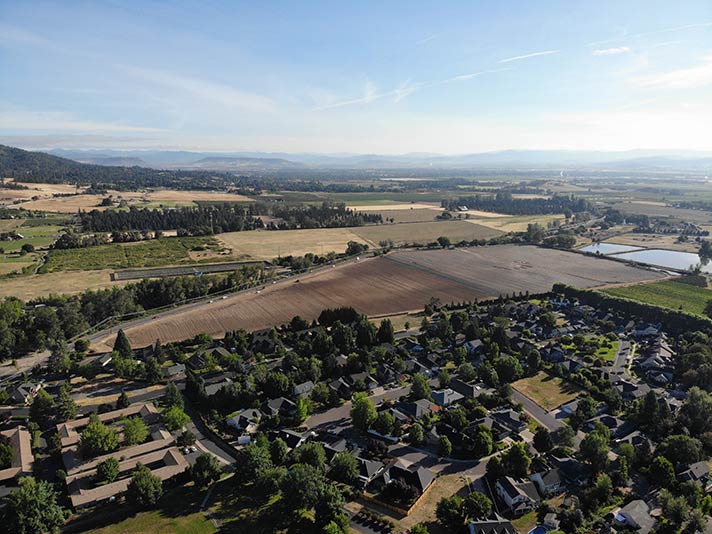My View – August 2019
This week my phone rang off the hook with questions from concerned citizens…all seeking my view on hemp farms and all wondering if Jacksonville was about to be surrounded. Here’s my take on the matter…for now.
With the passage of the 2018 Farm Bill, industrial hemp production is legal nationwide. In Southern Oregon, much like with marijuana, the climate is ideal and grow sites are now everywhere. Formerly fallow land is now blanketed in black and white plastic sheeting (it keeps in moisture and deters weeds) and land owners are reaping long-awaited profits from America’s newest cash crop. Hemp farmers are eagerly paying $2000/acre up-front to willing agricultural land owners and big corporate money has arrived.
Industrial hemp sites don’t need to be sited in the hinterland and can be seen in residential areas, so long as the zoning is Exclusive Farm Use. Grows now line the Hemp Highway—the Highway 238/West Main Street route that leads from Jacksonville into Medford. Today, a jaunt to Bi-Mart involves passing by fields and fields as is the case everywhere in Jackson and Josephine counties.
Hemp is being grown for two reasons: fiber and oil. The CBD oil derived from hemp is what’s driving the market in hopes that the CBD oil proves to be a “real” medicinal product. Look in any retail shop today and you’ll find CBD in scores of products. In my own family, there’s disagreement on the efficacy of the oil with some swearing by it and others calling it “snake oil.” Soon, the FDA is expected to rule on the efficacy of CBD oil, which will partially determine the future of hemp.
In my view, I’d like to see hemp (and pot) be genetically engineered so that it doesn’t smell…if it’s possible. Today, Jackson County officials report that 50,000 acres of hemp is under cultivation. Since plants don’t contain psychoactive chemicals (THC) like “pot,” there’s no limit to the number of plants grown per acre—hence no fenced-in enclosures that are limited to two acres. With hemp, negative environmental impacts not only include odor but potential burning and/or trashing of the plastic sheeting, agricultural water shortages, erosion and more.
Here in Jacksonville, many are concerned that three agricultural parcels surrounding the city may become hemp farms. In fairness, I’ve spoken with residents who prefer hemp sites to housing tracts and would rather put up with a skunk-like odor than a new neighborhood. I have spoken personally with Dave Freel, (29-acre JK-1 site abutting the gas station, Royal Mobile Estates that connects to N. Oregon Street) and Alan DeBoer, (11-acre JK-3 site on E. California Street abutting the Pheasant Meadows neighborhood) about their plans for hemp. Both Mr. Freel and Mr. DeBoer have declined to lease their parcels to hemp farmers and have each walked away from potential lease receipts ranging from $100,000 to $250,000. Both Freel and DeBoer commented that the impact of hemp on town would be significant while voicing their hope that the city would eventually annex their parcels to enable development. Neither is planning to use the “Annex my land or you’ll get hemp” threat. The third parcel, owned by Dr. David Young (50-acre JK-10 site, the former pear orchard across from JK-1 on the south side of N. 5th Street) is currently being planted…to what crop the Review could not confirm. However, after numerous attempts to reach the landowner and his farm manager, I conducted a brief site visit and was told by a farm worker that the acreage was indeed being planted to hemp.
Stay tuned Jacksonville…there’s more to come on this matter in Our Small Town with Big Atmosphere!

 Whitman Parker is Owner and Publisher of Jacksonville Review and Southern Oregon Wine Scene magazines.
Whitman Parker is Owner and Publisher of Jacksonville Review and Southern Oregon Wine Scene magazines.
The use of arable land to produce useful cash crops is a net positive, far preferable to the endless acres of star thistle we have become used to.
It stinks! This whole valley is going to smell like a skunk! See what THAT does to tourism!
As a Jacksonville resident, I would rather have a nice neighborhood!
Whit,
Thanks for this informative piece.
Great article. Thanks Whit!
Wow! So much talk about the open lands at the entrances to downtown Jacksonville. With lots of questions and very few answers… Until now thank you so much for the clarity. I am disappointed that the parcel on 238 just past the Chevron station is going hemp. It has a connotation to it that I just not ready to move past I guess. I guess we don’t have a voice in the matter? Though, at this point I I think I would rather it be hemp than a 100 new houses .. lesser of two evils I guess
People are never satisfied, the smell bothers you but not the fact that vacant fields grow star thisles instead of producing any thing at all. A nice neighborhood sounds good but a few more of those than there’s no “end or beginning” for j ville and medford and ‘it might be a nice looking neighborhood but by the way things look, low end housing would be going it there and those neighbor’s are going to nothing but nice things to the neighborhood.
TULIPS. Netherlands. 16th century .
So grateful for a bit of media coverage of a very big shift taking place in our valley. There has been very very little reporting and what there is has been uncritical. With big out-of-state entities moving in, I feel like we are in the beginning of one of those documentaries where a small town/village gets massively disrupted by corporate greed. Hope I’m wrong. I’ve found a deep sense of home on a property right next to a vineyard and worry every day that it’s going to get pulled up and turned to hemp. I don’t think I could live under the cloud of dust and stench that would generate and no doubt my property value would plummet. Hope this at least generates some good for the community in some form or another.
Believe it or not it does generate money for the community this 50 acres will generate 150 jobs during harvest time. This is not big corporate moving in this is just a small farmer that hasn’t made money in 40 years now has the opportunity to make some money . As you know and many of you know American farmers lives paycheck to paycheck they have never made money this is the golden opportunity for American farmers to make money and to spend it in the community. I am proud to be that farmer.
I hear the plastic is used for a single crop and then goes to landfill. This is a step backwards in the attempt to reduce plastics on the planet. My beautiful view in Ruch is partly sullied by the huge field of white plastic that covers acres of ground now. Products made from hemp grown using biodegradable landscape fabric should be labeled as such so there’s awareness concerning how your cbd, paper or hemp skirt was grown, allowing consumers to purchase sustainable products.
As for the comment about the small-time farmer being able to grow something that’s going to allow them to make a living, I’m all for that. As a commercial building inspector for the rogue valley, I will tell you that more often than not these are either people looking to plant and get big corporate attention, sell to them, and turn a huge profit. And that’s exactly what’s happening… Big money is coming in.. Consolidation.
Thank you! That answered many of my questions and nice to know many share my same concerns with all of the plastics used, the clouds of dust blanketing Jacksonville and the whole Rogue Valley as well as the smell. It looks like a brownish smog but is really dirt all around the valley. I would love to see it all genetically modified to remove the odor too. Thanks again for keeping us all informed.